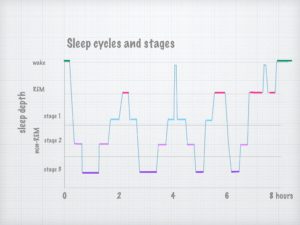How Important is a Good Night’s Sleep?
Posted by Handan Erdogan on 23rd Mar 2017
Why do we sleep?
Without influence of external factors we spend one third of our lifetime sleeping!
Looking at evolution lying unconscious would be a risk for a living being, so there must be some kind of advantage to outweigh this risk. For a long time we thought sleep is just a passive state and thus wasted time of our lifetime.
Scientists still aren’t quite sure why, but obviously certain processes in body and brain can’t happen simultaneously during conscious brain activity.
What happens during sleep?
Research shows that during sleep the brain clears end products of energy consumption of a cell (i.e. adenosine), repairs and heals tissues (immune system) and restores energy.
Further, the information we acquire during waking time is consolidated during sleep through reorganization of neural connections (neural plasticity). That means that what we have learned during the day is memorized for long term.
How is sleep regulated?
There are two processes which regulate quantity, quality and timing of sleep and wakefulness. The sleep homeostatic and the circadian process.
The sleep homeostatic process tries to keep the balance between wakefulness and sleep to a ratio of approximately 2:1. This works by means of the so called ‚sleep pressure’. During wakefulness certain substances (most important adenosine) accumulate and increase the sleep pressure which is felt as a stronger getting need to sleep the longer a person is awake. Caffeine for example is an adenosine-antagonist.
The circadian process regulates the 24 hour pattern of biological activities, like body temperature, hormone production and the sleep-wake cycle. It is the biological inner clock and promotes wakefulness during daylight and sleep during night (through melatonin secretion and decrease of cortisol).
The two processes interact and balance each other. The highest peak of sleep pressure occurs during the night around 2/3 pm and again a little lower peak at 2/3 in the afternoon (explaining the „post-lunch dip“). The melatonin secretion under the circadian process starts in the late evening hours. The best window for sleep initiation is when the sleep pressure keeps rising towards the end of the day and the melatonin secretion has started.
Disruption of sleep regulation
The above mentioned mechanisms are influenced by the genes and by external factors, such as food, drugs, temperature, naps, stress, exercise, daily schedules, alarm clock, travelling across time zones etc.
How does sleep look like in a diagram (hypnogram)?

Our sleep is composed of different cycles and these cycles have different stages of sleep depth. In the first cycles non-REM sleep dominates and in the second half of sleep REM sleep proportion increases.
Non-REM sleep
When we fall asleep we normally enter directly the NREM (non rapid eye movement) sleep, which dominates the first half of several sleep cycles during the night. It has different stages describing the depth of the sleep. Especially the deep sleep seems most important for recovery and healing of body and brain. Whereas probably each stage has a specific not yet known function.
REM sleep
REM (rapid eye movement) sleep is the smaller part and occurs predominantly towards the end of the night. It is a shallow sleep where the brain gets activated but the muscles paralyzed. Dreaming occurs mostly in REM sleep. It’s probably the part of sleep where building and strengthening of new neural connections is predominant (neural plasticity) and is thus important for learning and cognitive performance.
Larks and night owls
On average an adult needs 7-8 hours sleep to keep the homeostasis. Of course there is a small percentage who need genetically less or more sleep. There are also some people with shifted chronotypes. Some wake up earlier and are most alert the first part of the day (larks). Others are most alert the second part of the day and go to bed later than the average (night owls).
Effects of napping
A short nap of 10-20minutes during the peak of sleep pressure after lunch can have beneficial effects, especially on cognitive performance by reducing sleep pressure. As long as it is cut short before getting into deep sleep. Otherwise the person might feel worse afterwards because of the grogginess from waking up from deep sleep.
So why is sleep important? What happens if we don’t sleep enough?
Instead of an unproductive passive state, sleep is an active process in terms of energy restoration, healing and cellular defense as well as learning and neural plasticity.
Knowing that, it’s obvious that sleep deprivation will have negative effects on short term (memory and learning are affected as well as mood and emotion) ….. and can lead to serious health problems on the long term (obesity, diabetes, depression, lower life expectancy, inflammation, impaired immune function, high blood pressure…just to name a few).
On the other hand optimizing sleep quantity, quality and timing can enhance physical and mental performance. So there is great interest for example in sport science to maximise athletic performance and optimise recovery and training response.

 Australian Owned | Cruelty-Free Beauty, Where We Lead, We Don't Just Follow
Australian Owned | Cruelty-Free Beauty, Where We Lead, We Don't Just Follow


